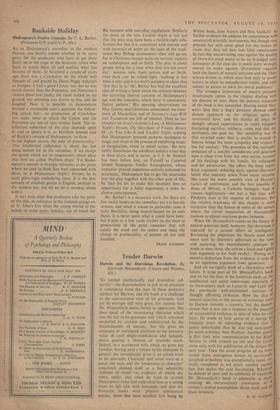Tender Darwin .
'So limited intellectually and insensitive cul- turally'—the determination to jerk us to attention is announced from the start in these prefatory epithets for Darwin, and the book is a challenge to the conventional view of his greatness. And yet he emerges still very great, for reasons that Dr. Himmelfarb seems barely to appreciate. She does speak of the unassuming character which was the key to his greatness and 'which remained unspoiled by acclaim and undistracted by the blandishments of success,' but she gives no sustained or convinced attention to the immense value of such single-mindedness and indepen- dence guiding a lifetime of scientific work. Indeed, in a manoeuvre with which we grow too familiar, having paid a tribute to his character in general she immediately gives it an adroit twist to his discredit. Character and mind were of a piece, 'she says, and the 'tenderness of character' sometimes showed itself as a less admirable 'softness of mind'—as evidence of which she notes, oddly, that when he tried to re-read Shakespeare (who had enthralled him as a young man) he felt sick with boredom, and that his favourite books were 'popular sentimental novels,' those that most satisfied him being by
0 s.
Y it
Walter Scott, Jane Austen and Mrs. Gaskell! A further evidence she adduces his contentment wit amateurish scientific instruments; but though the provide her with some good fun she makes n claim that they led him into false conclusion In fact this unconvincing case against the qualit of Darwin's mind seems to be an ill-judged reir forcement of the case she is much more strong' moved to make against 'Darwinism'—again: both the theory of natural selection and the 'Dal winian dream in which man had only to prob nature to elicit its metaphysical truths, and onl submit to nature to solve his moral problems.' The strongest impression of sincere person'i involvement comes in the chapter dealing wit the descent of man. Here the polemic intentio of the book is less concealed. Having noted Dar win's idea that a dog's devotion showed sum distant approach to the religious spirit 0 reverential love, and his dislike of what h thought absurd superstitions in many religion (including sacrifice, celibacy, caste and diet re strictions), she goes on, 'His sensibility was 0 that inverted order that is unable to extend 14 human beings the same sympathy and respect i has for animals.' The grossness of this misrepre sentation of a notably considerate and generou man is clear even from her own earlier accoun of his dealings with his family, his colleague' and his adversaries. She offers the most super ficial argument, debating style, against Darwin! belief that morality arises from social impulse She takes the worst possible view of Huxley' tactics of controversy and the best possible 01 those of Mivart, a Catholic biologist. And 01 course—legitimately--she has a fine time with Piltdown man at the expense of scientists. Bul the relative frankness of this chapter is more attractive than the finesse of some of the others where the clever imputation of discreditable motives to almost everyone grows tiresome. When Dr. Himmelfarb comes to the theory of natural selection itself, however, the cleverness 0 replaced by a serious effort of intelligence. Reviewing the objections the theory must face. some seen by Darwin's adherents at the time. and analysing the unsatisfactory attempts he made to meet them, she carries a lucid and tightlY knit argument to her final verdict : .'Posing as 3 massive deduction from the evidence, it ends uP as an ingenious argument from ignOrance; And yet we rightly think of a Darwinian veva' lution. A large part of Dr. Himmelfarb's book. and by far the best, is the historical study of Chi(' intellectual and social innovation, especially Cl its forerunners such as Lamarck and Lyell ant', the previously well-established . currents 0,` thought affirming evolution. How the idea 01 natural selection as the means a evolution earn': to Darwin remains a .mystery, but she demo"' strates that it was not a response to the pressure of accumulated evidence, in spite of what he said later. He made so little secret of it during his leisurely years of collecting evidence that it seems remarkable that he was not anticipated by more scientists than Wallace. Another puzzle is that their joint communication to the R0Y3 Society in 1848 created no stir and the furore came only with the publication of the Origin the next year. Then the usual progress of an innc' vation from , outrageous heresy to uncriticallY accepted orthodoxy was exceptionally rapid, Or' tually completed in ten years. another curicu0 fact that makes the case fascinating. Whatever its defects of tone and its subtleties of intention. Dr. Himmelfarb's book is' admirable in doell. menting an extraordinary innovation in society's central assumptions about itself and it5 place in nature.
y h D. W. DARDIr''''
3 •-•


































 Previous page
Previous page